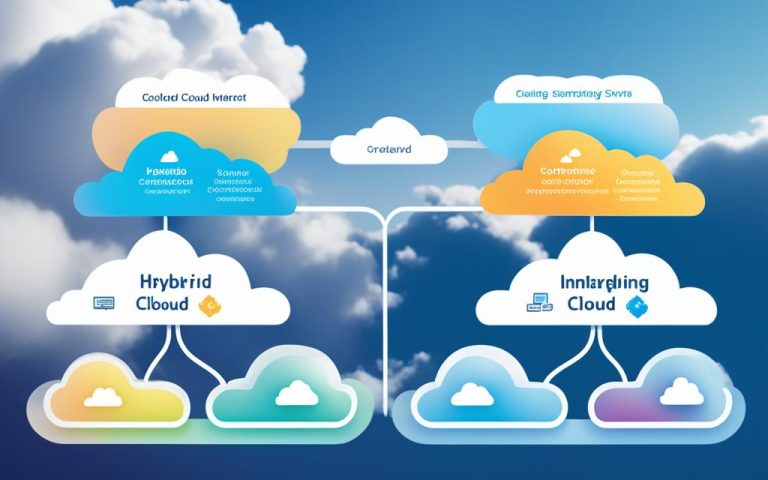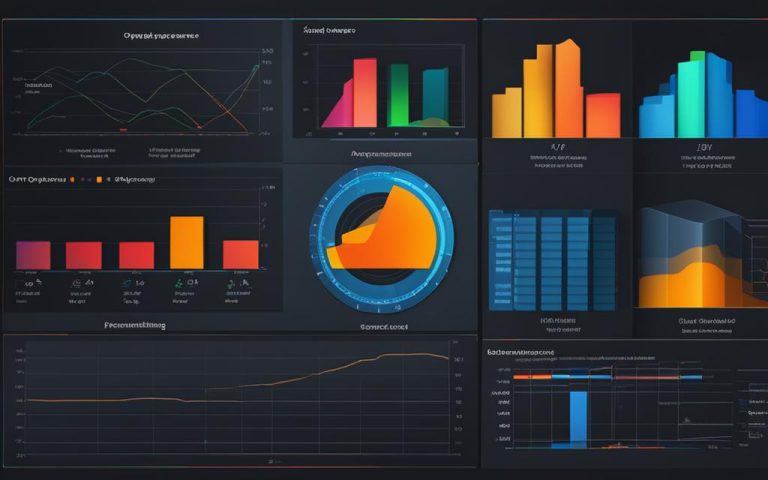Linux distributions play a pivotal role in optimizing cloud networking solutions for enhanced performance and security. They provide the capabilities and permissions necessary to ensure optimum performance of cloud workloads, consistency across platforms and providers, and the flexibility to choose technologies that best meet business goals.
Linux’s open-source development model allows organizations to avoid vendor lock-in and adopt different infrastructure types and operating models in cloud environments. Red Hat Enterprise Linux is a popular choice, offering open source innovation, consistency across infrastructures, container portability, massive scalability, and continuous security.
With Linux distributions, organizations can harness the power of cloud networking to drive their digital transformation strategies and achieve significant business outcomes. Whether it is accelerating application deployment, increasing scalability, or enhancing security, Linux distributions provide the foundation for successful cloud networking implementations.
In this article, we will explore why Linux is ideal for cloud environments, delve into its role in cloud networking security and networking, discuss how it supports developing and deploying cloud-native applications, and examine the emerging trends and future prospects of Linux in cloud networking.
Join us as we uncover the integral role of Linux distributions in optimizing cloud networking solutions and shaping the future of cloud computing.
Why Linux is Ideal for Cloud Environments
Linux is a highly suitable operating system for cloud environments due to its open source nature and flexibility. With a long history in cloud computing and virtualization, Linux brings a wealth of benefits to these environments, just as it does to traditional IT deployments.
One of the key advantages of Linux is its open source development model, which allows organizations to avoid vendor lock-in and easily adopt different infrastructure types and operating models. This flexibility is essential in the ever-evolving landscape of cloud environments, where businesses need the freedom to choose technologies that align with their specific requirements and goals.
Linux distributions offer a range of benefits that make them ideal for cloud environments. These include:
- Subscription models: Linux distributions often offer flexible subscription models that can be tailored to meet the needs and budget of organizations operating in cloud environments.
- Operational costs: By leveraging Linux, organizations can benefit from reduced operational costs, as the open source nature of the platform eliminates the need for expensive licensing fees.
- Support models: Linux distributions provide comprehensive support models, ensuring that businesses have access to the assistance they need when managing their cloud environments.
- Integrations: Linux distributions are designed to seamlessly integrate with existing infrastructure and third-party technologies, enabling businesses to leverage their current investments while taking advantage of the flexibility and scalability of cloud environments.
Furthermore, Linux’s open source development model fosters innovation and allows for the adoption of cutting-edge technologies like Kubernetes and edge computing. Kubernetes, an open source container orchestration platform, helps organizations efficiently manage and scale containerized applications in cloud environments. Edge computing, on the other hand, brings computing resources closer to the data source, reducing latency and improving overall performance.
The flexibility, adaptability, and compatibility of Linux make it an ideal choice for businesses looking to harness the power of cloud environments effectively.
Linux in Cloud Networking: Security and Networking
Linux plays a pivotal role in cloud networking by providing robust security features and advanced networking technologies. With its open-source nature and strong community support, Linux offers a secure and reliable foundation for cloud environments.
One of the key security mechanisms in Linux is SELinux (Security-Enhanced Linux), which provides granular access controls and protects against vulnerabilities and emerging threats. By enforcing mandatory access controls, SELinux ensures that only authorized processes and users can access critical resources, enhancing the security of cloud networks.
“Linux’s strong security features, such as SELinux, are essential for safeguarding cloud networks against potential security breaches and unauthorized access. By leveraging these mechanisms, enterprises can mitigate risks and protect sensitive data in cloud environments.”
Linux also contributes significantly to software-defined networking (SDN) and network virtualization. It leverages technologies such as bridges and overlay protocols to optimize data transmission and enhance network performance in cloud computing. These networking capabilities allow for efficient data flow and seamless communication between cloud infrastructure components.
Furthermore, Linux plays a crucial role in ensuring data privacy and compliance in the cloud. It enables encryption of sensitive data, secure transmissions, and adherence to privacy frameworks. By implementing these measures, Linux contributes to building trust among users and maintaining regulatory compliance in cloud networking.
Through its robust security features and advanced networking technologies, Linux establishes itself as a trusted platform for cloud networking. Its flexibility, scalability, and open-source nature make it an ideal choice for organizations seeking enhanced security and networking capabilities in their cloud environments.
Key Points:
- Linux provides robust security features such as SELinux to protect against vulnerabilities and emerging threats.
- Linux contributes to software-defined networking (SDN) and network virtualization, optimizing data transmission in cloud computing.
- Linux ensures data privacy and compliance through encryption, secure transmissions, and adherence to privacy frameworks.
Linux Security and Networking Features
| Feature | Description |
|---|---|
| SELinux | Provides granular access controls and protections against vulnerabilities and emerging threats. |
| Software-Defined Networking (SDN) | Enables efficient data transmission and network performance optimization in cloud computing. |
| Network Virtualization | Allows for seamless communication and data flow between cloud infrastructure components. |
| Data Encryption | Ensures the privacy and security of sensitive data transmitted in cloud networks. |
| Privacy Frameworks | Supports compliance with data privacy regulations and frameworks in cloud environments. |
With its comprehensive security features and networking capabilities, Linux continues to be a trusted partner in cloud networking, empowering organizations to build secure and efficient cloud environments that meet their business needs.
Linux in Cloud Networking: Developing and Deploying Cloud-native Applications
Linux plays a crucial role in the development and deployment of cloud-native applications, providing the foundation for efficient and scalable cloud-native architectures. Containerization platforms like Docker and Kubernetes, which are built on Linux, enable organizations to adopt a microservices approach, ensuring portability and scalability in cloud-native development.
Containerization:
Containerization is a key aspect of cloud-native application development, allowing applications to be packaged with their dependencies and run consistently across different environments. Linux distributions serve as the backbone for containerization platforms, providing the necessary features and capabilities to deploy and manage containers efficiently. With Linux as the base operating system, developers can leverage the benefits of containerization, including faster deployment, improved resource utilization, and simplified application management.
Kubernetes:
Kubernetes, an open-source container orchestration platform, is widely adopted in cloud-native environments. It automates the deployment, scaling, and management of containerized applications, making it easier to build, deploy, and scale cloud-native applications. As Kubernetes is built on Linux, it seamlessly integrates with Linux distributions, ensuring compatibility and optimal performance for cloud-native workloads.
Optimized Linux Distributions:
Various Linux distributions are optimized specifically for cloud environments, providing tools and services that enhance cloud application development and compatibility. These distributions consider factors such as support, ease of package management, and integration with cloud services. Here are some notable Linux distributions for developing cloud-native applications:
| Linux Distribution | Key Features |
|---|---|
| Red Hat Enterprise Linux | Open-source innovation, consistency across infrastructures, container portability, massive scalability, continuous security. |
| Ubuntu | Wide community support, extensive package repositories, easy deployment on public and private clouds. |
| SUSE Linux Enterprise | Enhanced security features, optimized for SAP workloads, seamless integration with cloud providers. |
These Linux distributions provide developers with the necessary tools, libraries, and frameworks to build robust cloud-native applications. They offer a range of support options, ecosystem integrations, and scalability features to meet the specific requirements of cloud-native development.
In summary, Linux, with its support for containerization platforms and optimized distributions, plays a crucial role in the development and deployment of cloud-native applications. By leveraging the power of Linux in cloud networking, organizations can build scalable and efficient cloud-native architectures that meet the evolving demands of modern cloud environments.

Linux in Cloud Networking: Emerging Trends and Future Prospects
The impact of Linux on cloud networking continues to evolve with emerging trends and future prospects. As technology advances, the synergy between Linux and cloud networking will shape the future of computing landscapes. From serverless computing to edge computing, Linux is at the forefront of innovative developments in the cloud.
Serverless Computing and Function-as-a-Service (FaaS)
Linux plays a crucial role in serverless computing and Function-as-a-Service (FaaS), offering improved cloud performance and scalability. With serverless architecture, developers can focus on coding applications without managing the underlying infrastructure. Linux provides the foundation for FaaS platforms, enabling seamless execution of functions and efficient resource allocation. This empowers organizations to build and deploy applications faster, leading to enhanced productivity and cost-efficiency.
Linux-based Edge Computing
Edge computing is gaining prominence in the cloud landscape, and Linux is emerging as a key player in this domain. By bringing computation and data storage closer to the source of data generation, edge computing reduces latency, improves response times, and enhances overall cloud performance. Linux-based operating systems facilitate the deployment of edge computing solutions, enabling organizations to leverage real-time analytics, IoT devices, and low-latency applications. However, edge computing also poses challenges such as data security and network connectivity, which need to be carefully addressed for successful implementation.
“Linux’s role in edge computing is transformative, propelling cloud architectures towards a distributed and decentralized paradigm. As the demand for low-latency applications and real-time analytics grows, Linux-based edge computing solutions offer unprecedented opportunities for businesses to revolutionize their operations.”
By harnessing the power of Linux in emerging trends like serverless computing and edge computing, organizations can unlock new frontiers in cloud networking. These technologies enable businesses to achieve greater agility, scalability, and cost optimization, positioning them for success in the future of computing.
Future Prospects
The future prospects of Linux in cloud networking are promising. As more businesses transition to the cloud, Linux’s open-source nature and robust ecosystem will continue to drive innovation and modernization. The flexibility and scalability offered by Linux distributions create a solid foundation for building and managing cloud infrastructure. Additionally, ongoing advancements in containerization technologies like Docker and Kubernetes present exciting opportunities for Linux-based cloud-native application development and deployment.
The future of cloud networking will see Linux playing a pivotal role in shaping the computing landscape. From optimizing cloud performance and security to enabling emerging technologies, Linux has firmly established itself as a cornerstone of cloud networking solutions.
Conclusion
Linux distributions play a vital role in cloud networking, offering the capabilities and flexibility needed to optimize cloud operations. With its open-source development model, Linux allows organizations to avoid vendor lock-in and select technologies that best suit their business goals. Its robust security features, networking technologies, and support for cloud-native applications make Linux a preferred choice for cloud environments.
As technology continues to advance, the role of Linux in cloud networking will evolve, shaping the future of computing landscapes. Linux distributions provide the foundation for efficient and secure cloud networking solutions, enabling organizations to achieve enhanced performance and scalability. The open-source nature of Linux empowers businesses to adapt to changing cloud networking requirements, while ensuring consistency and avoiding the limitations of proprietary systems.
Furthermore, Linux’s contribution to cloud networking goes beyond providing a secure and flexible platform. It enables organizations to leverage emerging trends such as serverless computing, edge computing, and Function-as-a-Service (FaaS) to drive innovation and maximize the potential of cloud architectures. With its vast range of Linux distributions tailored for cloud environments, businesses have access to a wealth of tools and services that simplify and accelerate cloud-native application development.
In summary, Linux’s integral role in cloud networking, along with its open-source nature, robust security features, and support for cloud-native applications, positions it as a key player in the ever-evolving cloud landscape. As businesses look to optimize their cloud operations, Linux distributions will continue to play a pivotal role in shaping the future of cloud networking and computing environments.
FAQ
What is the role of Linux distributions in cloud networking?
Linux distributions play a pivotal role in optimizing cloud networking solutions for enhanced performance and security. They provide the capabilities and permissions necessary to ensure optimum performance of cloud workloads, consistency across platforms and providers, and the flexibility to choose technologies that best meet business goals.
Why is Linux ideal for cloud environments?
Linux is well-suited for cloud environments due to its open-source nature and flexibility. It has a long history in cloud computing and virtualization, providing the same benefits it brings to traditional IT deployments. Being open source allows organizations to avoid vendor lock-in and easily adopt different infrastructure types and operating models.
How does Linux contribute to security and networking in cloud networking?
Linux plays a pivotal role in cloud networking by providing robust security features and networking technologies. It offers strong security mechanisms that protect against vulnerabilities and emerging threats, such as SELinux for access control. Linux also contributes to software-defined networking (SDN) and network virtualization, using bridges and overlay protocols to optimize data transmission in cloud computing.
How does Linux support the development and deployment of cloud-native applications?
Linux plays a crucial role in developing and deploying cloud-native applications. Containerization platforms like Docker and Kubernetes, which are based on Linux, facilitate efficient microservices architecture, ensuring portability and scalability in cloud-native development. Several Linux distributions are optimized for cloud environments, offering tools and services for improved cloud application development and compatibility.
What are the emerging trends and future prospects for Linux in cloud networking?
The impact of Linux on cloud networking continues to evolve with emerging trends and future prospects. Linux plays a role in serverless computing and Function-as-a-Service (FaaS), delivering improved cloud performance and scalability. Linux-based edge computing is also emerging as a potential solution for cloud architectures, offering opportunities and challenges in the ever-evolving cloud landscape.
How does Linux contribute to the role of Linux distributions in cloud networking?
Linux distributions are integral to cloud networking, providing the capabilities and flexibility required to optimize cloud operations. Linux’s open-source development model allows organizations to avoid vendor lock-in and choose technologies that best align with their business goals. With robust security features, networking technologies, and support for cloud-native applications, Linux remains a preferred choice for cloud environments. As technology progresses, Linux’s role in cloud networking will continue to evolve, shaping the future of computing landscapes.




















One Comment